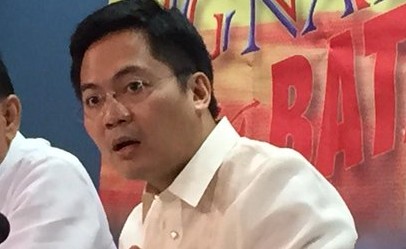Nograles questions ‘much lower’ 2019 proposed national budget

Davao City Rep. Karlo Nograles. INQUIRER.net FILE PHOTO
The House of Representatives committee on appropriations began its deliberations into the P3.757-trillion 2019 national budget on Tuesday, with chair Rep. Karlo Nograles questioning the decrease in the national budget compared to last year’s, and the slashed budgets of some key agencies.
Nograles noted that the proposed 2019 budget was P10 billion lower than the P3.767-trillion national budget in 2018.
“Let’s address the elephant in the room. You are coming to ask a budget that’s P10 billion lower in absolute terms. All of us here are concerned with the reductions in various departments and agencies namely the DOH, DepEd, and DPWH,” Nograles told Secretary Benjamin Diokno of the Department of Budget and Management (DBM), which is part of the DBCC.
Diokno said it was “misleading” to compare the P3.757-trillion cash-based budget to the 2018 obligation budget.
He explained that the cash-based equivalent was derived from the monthly disbursement program, net of accounts payables of agencies. Thus, the 2019 budget is P439.4 billion or 13.2 percent more than the 2018 budget cash-based equivalent of P3.318 trillion.
Article continues after this advertisementNograles said he was expecting at least P3.9 trillion budget for 2019. He lamented that this was the first year that the country is having, “in absolute terms, a reduction of the budget.”
Article continues after this advertisementThe Davao City 1st District representative also questioned the budget cuts in the proposed budget such as the budget of the Department of Health (DOH), which was decreased by P35 billion; Department of Education (DepEd), by P77 billion; and the Department of Public Works and Highways (DPWH) by P95 billion.
There were also P5-billion reductions in the budgets of the Department of Social Welfare and Development (DSWD) and Commission on Elections (Comelec), he added.
He said that this was even more questionable especially in light of the implementation of the Tax Reform for Acceleration and Inclusion (Train) Law this year.
“For 2019, ang hirap naman ipaliwanag sa mga kababayan natin na nag-reduce tayo ng mga classrooms, nag-reduce tayo ng mga barangay health units, nag-reduce tayo ng roads dahil mayroon tayong ginagawang ganitong cash-based,” he said.
“Lalung lalo na may pinasa tayong TRAIN (Tax Reform for Acceleration and Inclusion) law, gumawa tayo ng mga taxes dito. Ano naman ang sasabihin namin sa mga kababayan namin,” he added.
Cash-based budget
During Tuesday’s hearing, the Cabinet-level Development Budget Coordination Committee (DBCC) also presented the overall economic targets, expenditure levels, and sources of funds of the country.
Diokno said the 2019 budget could be deemed “revolutionary” because it would be the first cash-based budget of the government.
The Budget secretary said under this system, all government programs and projects budgeted for the fiscal year should be implemented and delivered within the same fiscal year.
“Underspending is the highest form of incompetence,” Diokno stressed.
He added that goods and services delivered, inspected, and accepted until the end of the fiscal year would be settled within the same year, up to the three-month period following the end of the fiscal year, or the Extended Payment Period (EPP).
The House appropriations committee will conduct its hearings on the budget proposals of the different government agencies and departments from July 31 to August 29. /jpv
RELATED STORY